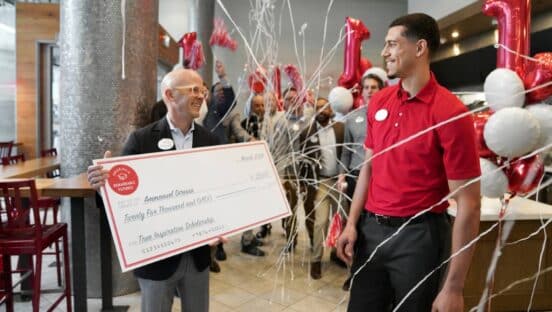After two years of salary freezes, restaurant chains are starting to increase employee pay in an effort to secure their loyalty, according to a new survey by consulting firm Hay Group and the Chain Restaurant Compensation Association (CRCA).
The survey cites a projected median budget increase of 3 percent for all restaurant employee groups in 2011, slightly above the projected 2.8 percent increase in general industry.
The salary increase for chain restaurants was 2 percent in 2010, when 30 percent of the surveyed chains reported a salary freeze. None of the 39 CRCA organizations in the most recent survey reported a complete freeze for this year.
Tom McMullen, vice president and North American reward practice leader of Hay Group, says the projected 3 percent increase in salaries reflects a general increase in confidence in the restaurant industry.
“The increase is driven by a relatively healthier economy in general and in the restaurant sector in particular," says McMullen, citing increases in restaurant traffic and revenue in 2010 over 2008 and 2009, when the economy was in a historic tailspin.
While the 3 percent increase is still behind prerecession numbers—salary increases were 3.5 percent in 2006 and 2007 and 3.1 percent in 2008—it represents a significant improvement over last year and a sign that restaurants are feeling more optimistic after the recession, McMullen says.
“If you look 12 months ago, the chain restaurant business wasn’t in as good shape,” McMullen says. “2009 and 2010 were the low points of the last 10 years. So we aren’t fully back to where we were, but at least [the level of salary increase] is heading north from where it was.”
Still, not every chain restaurant is on board with lifting its salary freeze; none of the fast food chains interviewed for this article had lifted an implemented freeze this year.
El Pollo spokeswoman Julie Weeks wrote in an e-mail that the 400-unit chain’s salary freeze will remain in place “as of now … [but] that may change.”
Other quick-serve chains might also need to change their position on salary freezes soon; one reason for lifting a freeze, McMullen says, is concern among restaurant chains that they will lose employees if they don’t increase their salaries.
“A lot of organizations that enacted a salary freeze in 2009 were loath to do that in 2010 and 2011,” he says. “It’s much more palatable to have a salary freeze for one year. Companies that are forced to do that two years in a row jeopardize employee engagement levels and really jeopardize employee retention levels.”
The prospect of mass quitting may be small, with national employment down 7 million jobs from before the recession. But the labor market is improving—national employment grew by 2 million jobs in the last 14 months—and restaurants once again need to worry about retaining their workforce, says National Restaurant Association senior vice president of research Hudson Riehle.
“It is not surprising that industry hiring growth has accelerated and salary levels are increasing as the general economic condition firms up,” Riehle says. “The industry is obviously in competition with other industries for employees, so compensation and benefit levels have to remain competitive.”
Before the recession put millions of people out of work, recruitment and retention were the restaurant industry’s perennial top challenges, Riehle says. And as the labor market slowly improves, he says there needs to be “a recognition within the restaurant industry of the importance of developing career paths for employees.”
This, in turn, will help the restaurant industry recover from the recession years, Riehle says, citing the “strong correlation between length of tenure and increased sales per square foot.”
In the here and now, the increased pay for chain-restaurant employees is a sign that the restaurant industry expects sustained, if slow, business growth, at least in 2011.
Until then, it serves as a reminder that the general economy, including the restaurant industry, continues to absorb the effects of the Great Recession.
“There is still a long way to go,” Riehle says.










